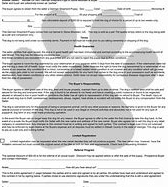House Training Your Puppy
gary, thanks for the advice. i do have a question though.
clyde is really pretty good with the housebreaking, but has the occasional accident. this tends to happen right at the back door, but only once every few weeks. when he is allowed his freetime in the house, he tends to just lay by the door, so it is not always evident to us that he is looking to go for to "potty". is there anything, in your experience, that would be easy to train him with, i.e. a bell or something similar, that he could use to alert us to his needs? i am just looking to avoid continued problems. any help would be awesome. thanks.
john
-
- · gsicard
- ·
Housebreaking is usually the tragedy of the novice dog owner. Many dogs which are raised outside in a run never need to be actually housebroken, preferring to use the ground for their act and seemingly sensing the fact that the house is not to be soiled. Dogs tend to defecate in areas, which they, or other dogs, have previously soiled, and will go to these spots if given the chance. Directly after eating or waking a puppy almost inevitably has to relieve himself. If he is in the house and makes a mistake, it is generally your fault, as you should have recognized these facts and removed him in time to avert disaster. If, after you have taken him out, he comes in and soils the floor or rug, he must be made to realize that he has done wrong. Scold him with "Shame! Shame!" and rush him outside. Praise him extravagantly when he has taken advantage of the great outdoors. Sometimes if you catch him preparing to void in the house, a quick, sharp "No" will stop the proceedings and allow you time to usher him out. Never rub his nose in his excreta. Never indulge in the common practice of striking the puppy with a rolled up newspaper or with your hand. If you do, you may be training your dog either to be hand shy, be shy of paper, or to bite the newsboy. Your hand should be used only in such a way that your dog recognizes it as that part of you, which implements your voice, to pet and give pleasure. In housebreaking, a "No" or "Shame" appropriately used and delivered in an admonishing tone is punishment enough. If your dog has been trained to soil on paper and subsequently you wish to train him to use the outdoors, a simple way to teach him this is to move the paper he has used outside, anchoring it with stones. Lead the dog to the paper when you know he is ready to void. Each day make the paper smaller until it has completely disappeared, and the pup will have formed the habit of going on the spot previously occupied by the paper. Puppies tend to prefer to void on a surface similar in texture to that which they used in their first few weeks of life. Thus a pup who has had access to an outside run is easily housebroken, preferring the feel of ground under him. Smaller breeds are sometimes raised on wire-bottom pens to keep them free of intestinal parasites. Occasionally puppies so raised have been brought into homes with central heating employing an open, grate-covered duct in the floor. To the pup the grate feels similar to his former wire-bottomed pen. The result, as you can well imagine, gives rise to much profanity and such diligence that the youngster is either rapidly housebroken or just as rapidly banished to live outdoors. If your pet is to be a housedog, a lot of grief can be avoided by remembering a few simple rules. Until he is thoroughly clean in the house, confine him to one room at night, preferably a tile- or linoleum-floored room that can be cleaned easily. Tie him so that he cannot get beyond the radius of his bed, or confine him to a dog house within the room; few dogs will soil their beds or sleeping quarters. Feed at regular hours and you will soon learn the interval between the meal and its natural result and take the pup out in time. Give water only after meals until he is housebroken. Puppies, like inveterate drunks, will drink constantly if the means is available, and there is no other place for surplus water to go but out. The result is odd puddles at odd times. "No," "Shame," "Come," and "Good boy" (or "girl"), spoken in appropriate tones, are the basic communications you will use in initial training. -
- · unknown
- ·
gary, thanks for the advice. i do have a question though. clyde is really pretty good with the housebreaking, but has the occasional accident. this tends to happen right at the back door, but only once every few weeks. when he is allowed his freetime in the house, he tends to just lay by the door, so it is not always evident to us that he is looking to go for to "potty". is there anything, in your experience, that would be easy to train him with, i.e. a bell or something similar, that he could use to alert us to his needs? i am just looking to avoid continued problems. any help would be awesome. thanks. john
Discussions With Recent Posts
The Pros and Cons of Having Guardian Dogs at HomeHaving a guardian dog can enhance security and companionship, but it also comes with responsibilities. Evaluate your lifestyle, living space, and commitment level before welcoming a furry...
-
Gary Admin
- General
- Replies (3)
"Dog Owner's Home Veterinary Handbook" The classic bestseller--expanded and updated The guide dog lovers have relied on for more than twenty-seven years, this handbook has been extensively revised to include the latest...
-
Kevin and Debby Nicholson
- Books and Literature
- Replies (1)
Interesting photos. How does the Bullmastiff perform in the Brazilian heat? I have friends in Recife where it's 80s year round and very few Molossers survive there. I do know that some Brazilian Police like the Tropa de Elite take pride...
-
BULLMASTIFF BRASILEIRO
- Replies (45)




